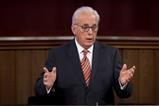Krish Kandiah suggests three ways Christians should react to Donald Trump’s historic comeback

I remember dancing on the streets of Chicago into the early hours on the night Barack Obama got elected to become the first Black President of the United States of America. But there was no celebration in our house this morning when the results came in that Donald Trump had become President Elect. Instead, I was overcome by that numb feeling that the world had suddenly become a more dangerous place.
I flicked through different news agencies hoping The Guardian app had got it wrong. I tried pinching myself to check I wasn’t still asleep having gone to bed too late because I was hooked on CNN. I shouted at the rowing machine, or rather the rowing machine listened to me shouting at all those who voted for someone who is a convicted sex offender, serial liar and who has promised to stop supporting Ukraine’s defence efforts and also who has pledged the biggest mass deportation in US history. I paced up and down the drive trying to bargain with God as though I had anything of use to offer. I sat glumly in my office, lacking the energy to focus.
Having experienced grief before, I recognised the pattern of denial, anger, bargaining, and depression, but was unwilling to get to what is considered the fifth stage of grief - acceptance. Instead I felt conflicted. I know God is in control, and I have absolute trust in his sovereignty, but at the same time, I don’t believe we are supposed to just accept it when bad things happen.
Jesus didn’t accept it when rich people abused their power and hijacked the temple for their own ends, making money instead of welcoming strangers. He took out a whip and drove out the greedy and selfish saying: “Get out of here! Stop turning my Father’s house into a market” (John 2:16).
I am also conflicted because my grief over what is happening in the US seems to put me at odds with many of my American brothers and sisters. Evangelical Christians are the largest base of Trump supporters and some say 80% voted for him.
Sofia Ferrer, an American who lives with my family, a proud citizen of the swing state North Carolina, and a Democrat-voter against the wishes of many of her friends and family, showed me her social feed this morning. It was a constant stream of comments such as these:
“Thank the Lord for Trump’s victory in the beautiful country we’re blessed to live in! Amen! Go Trump!”
“A physical weight lifted off our shoulders this morning. Praise Jesus.”
“God showed his mercy on our great nation tonight.”
I believe it is possible to love my brothers and sisters and disagree with them profoundly. I want to be a peace maker and bridge builder but today was a hard day to know how to do that.
How can we as Christians in the UK deal with our complex mix of emotions when we see what is happening not only in the US Church and political arena, but in the way it impacts the globe?
1. Don’t panic
The Harris campaign predicted the end of democracy with the election of Donald Trump. It is right to care about what will happen to the rule of law, international trade, human rights, climate action, global security and all the other ways a self-serving President might damage the global community. However, we don’t need to catastrophise, because as Christians we are convinced there is always a higher throne.
The early church faced complex political situations with the mighty Roman Empire, and many took the incredibly courageous stand of proclaiming Jesus as Lord, when the emperor demanded that title for himself alone.
Many of our spiritual forebears faced totalitarian regimes and the Church outlasted them all. Our faith is ultimately not in military might, political influence or financial power but in Jesus Christ. We believe one day, that: “at the name of Jesus every knee should bow, in heaven and on earth and under the earth, and every tongue acknowledge that Jesus Christ is Lord, to the glory of God the Father.” (Philippians 2:10-11)
2. Don’t be passive
I understand the temptation for Christians to choose a path of political passivity. When politics or politicians are fatally flawed and appear to be beyond our control, choosing to disengage is attractive. We can close our eyes in worship and forget about the challenges in front of us. We can sing louder to drown out the sounds of bad news and we can comfort ourselves in the sanctuary of the Church. This Christian cocooning, this holy abdication of the world is understandable but opting out when the going gets tough has never been part of the Christian life. When the crowds turned against Jesus, he wept for them and set his face towards the cross, scorning its shame.
3. Persevere
I believe we are called to patient endurance. To carry on living lives of passionate obedience to Christ whoever is elected. To welcome the stranger, feed the hungry, and care for the sick. To faithfully live out and speak out God’s word. To show to others the mercy and grace that we have received. To pray for those in power over us. To follow in the footsteps of Jesus. None of those things get rescinded with a new President.






































9 Readers' comments